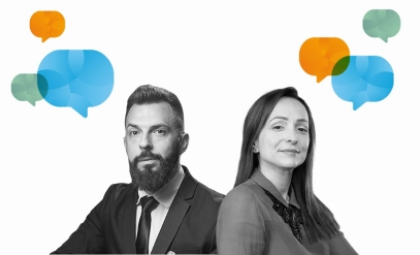

Language as a Strategic Tool: Supporting Talent Before Day One
In an increasingly global labour market, language and cultural preparation are becoming strategic factors for the successful integration and retention of international employees. Kristina Nikolova, founder and director of Kristina Progess, shares for “We Asked the Experts” how providing language support even before the first working day can reduce stress, build a sense of belonging, and become a key driver for faster inclusion, higher motivation, and stronger engagement of new team members.
What are the main language and cultural barriers foreign employees face when arriving in Bulgaria?
Many international professionals face challenges that go beyond vocabulary. The real difficulty lies in understanding unspoken workplace norms, adjusting to local communication styles, and navigating everyday situations - from administrative procedures to casual office conversations. Even confident English speakers may feel insecure when they can't express themselves in Bulgarian, leading to delays in adaptation, isolation, or disengagement. It can also affect their productivity and ability to show their potential. In addition, cultural barriers such as unfamiliar hierarchies or expectations around communication can make it harder to fully participate.
What impact does language training have before relocation, and why should it be part of an international mobility strategy?
Language preparation before relocation significantly reduces the emotional stress of starting a new job in a new country. It helps employees feel more in control from day one - not just in the office, but in daily life. When they arrive already equipped with basic communication skills and cultural insight, onboarding becomes faster, smoother, and more human. From an HR perspective, this means better retention, faster integration, and a more confident team member from the start. It also gives them confidence, a sense of acceptance, and the belief they can adapt and grow in their new environment.
What makes workplace language programs different from general language courses?
Corporate Bulgarian programs are tailored to the specific needs of a workplace. At Kristina Progress, we focus on role-based communication, task-specific vocabulary, and realistic simulations – meetings, presentations, small talk, and written communication. We also integrate soft skills and cultural etiquette. Unlike general courses, our workplace programs are practical and aligned with company goals. In our center we design programs according to the company’s field and the language needed.
How has the partnership between Kristina Progress and Manpower Bulgaria contributed to this mission? What does the future hold?
Our partnership has allowed us to scale what we do best - offer meaningful, effective training. Manpower Bulgaria brings HR insight, and we bring pedagogical and cultural expertise. Together, we help international employees not only function but truly feel they belong. This is at the heart of integration.
We believe this is our mission - to make Bulgaria a better place for foreigners, to ease their adaptation, and at the same time contribute to the country’s development by unlocking the potential of international talent. In this sense, our collaboration with Manpower is not just practical - it’s deeply values-driven and aligned with a shared long-term vision.
Looking ahead, we plan to develop joint language and integration programs tailored to specific industries and regions, expand onboarding packages for employers, and co-create sustainable models for long-term support of international hires. We see this partnership as a foundation for innovation in the space where HR, education, and social inclusion meet.
What role can technology, including AI, play in language training for third-country employees?
AI-powered platforms allow us to personalize learning, track progress, and provide flexible reinforcement between live sessions. Technology can also help when a student from a third country doesn’t speak English - acting as a real-time translator and facilitating the learning process. We aim to combine our methodology with new tech developments. Still, we believe the best results come when technology supports human empathy, guidance, connection and professional experience.










